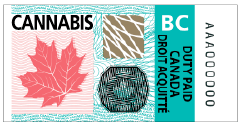Cannabis - What's legal?
There are strict laws and regulations around the legalization of non-medical cannabis. Before you buy, use, or grow your own non-medical cannabis, learn more about what’s legal and what’s not.
Legal age
You must be 19 years or older to buy, use, possess, or grow non-medical cannabis in B.C.
Buying
To protect your health, keep young people safe and help prevent crime in your community, non-medical cannabis is sold exclusively at government-run stores, licensed private retailers, and the B.C. government’s online store.
The BC Liquor Distribution Branch operates public retail stores and an online store.
The Liquor and Cannabis Regulation Branch is responsible for licensing and monitoring private retail stores. Licensed private retailers may sell cannabis and cannabis accessories. They may not sell liquor or tobacco or any items other than cannabis and cannabis accessories.
All legal non-medical cannabis has an excise stamp attached to its packaging. Federally-licensed producers and processors apply the appropriate excise tax stamp for British Columbia. If the product does not have a British Columbia stamp it is not legal for sale in B.C. Each province and territory has a different coloured cannabis excise stamp for products sold in their jurisdiction.

Possession
Adults 19+ can carry up to 30 grams of dried non-medical cannabis, or its equivalent, in a public place.
In addition, adults cannot possess any more than 1,000 grams of dried non-medical cannabis, or its equivalent, in a non-public place, such as at your home. This limit is per household and is based on the expected yield from four cannabis plants.
Public use
Adults 19+ can generally smoke or vape cannabis in public spaces where tobacco smoking and vaping are allowed. But remember, second-hand smoke can be harmful and irritating to people, especially children, so be mindful when smoking in public spaces.
Smoking and vaping cannabis are not allowed in the following public places:
- Playgrounds, sports fields, skate parks, swimming pools and spray pools, or any decks or seating areas associated these places
- Public buildings, workplaces, or common areas of apartments, condos, or dormitories, and within six metres of air intakes, windows, and doorways attached to these places
- Within six metres of bus stops, transit shelters, train stations, ferry docks and similar places
- Regional and municipal parks, except for designated campsites
- Provincial parks, except for areas identified or designated
- Health board properties, except in designated smoking areas
Registered hotel guests may smoke or vape cannabis in their hotel room if the hotel allows it.
Community care facilities, assisted living residences, and hospitals may designate specific rooms in which residents or patients can smoke or vape cannabis.
Non-medical cannabis consumption (in all forms) is banned on K-12 school properties, as well as any adjacent sidewalks or boulevards. It’s also illegal for both driver and passenger(s) to consume non-medical cannabis in a car.
Local and Indigenous governments can set additional restrictions on public use of non-medical cannabis under existing powers to establish bylaws.
There are exemptions for use of Health Canada authorized medical cannabis on school property and on inter-city buses, trains and boats as long as specific requirements are met. Details are available in the Cannabis Control Regulation under Part 4 – Medical Cannabis.
The Public Consumption factsheet (PDF, 622KB) provides additional details about public consumption in B.C.
Medical cannabis
Medical cannabis is within the responsibility of Health Canada. To find out more, go to Health Canada.
B.C. developed the factsheet Advisory on Medical Cannabis for Health Care Practitioners [PDF, 350KB] for health care practitioners about the important roles and responsibilities they have in the appropriate operation of the medical cannabis system and in preventing misuse.
Legislation
With public health and safety top of mind, the Province has legislation to provide legal, controlled access to non-medical cannabis in British Columbia:
- The Cannabis Control and Licensing Act aims to protect children and youth, promote health and safety, keep the criminal element out of cannabis, keep B.C.’s roads safe, and support economic development.
- The Cannabis Distribution Act establishes a public wholesale distribution monopoly, and public (government-run) retail sales, both in stores and online.
- Changes to the Motor Vehicle Act gives police tools to remove drug-impaired drivers from the road and deter drug-affected driving.
